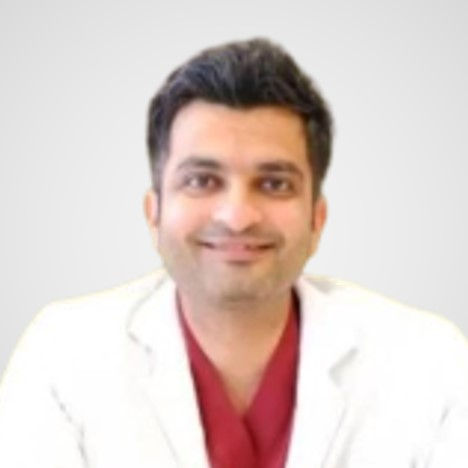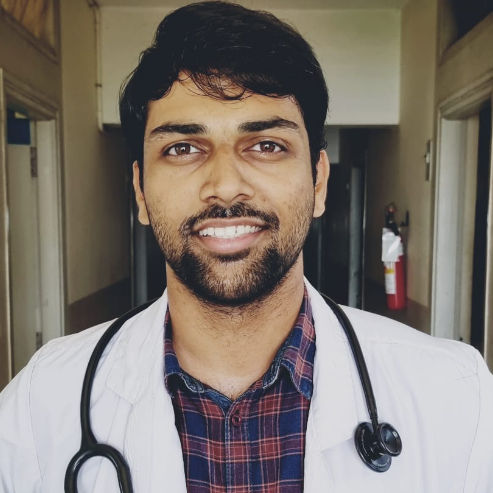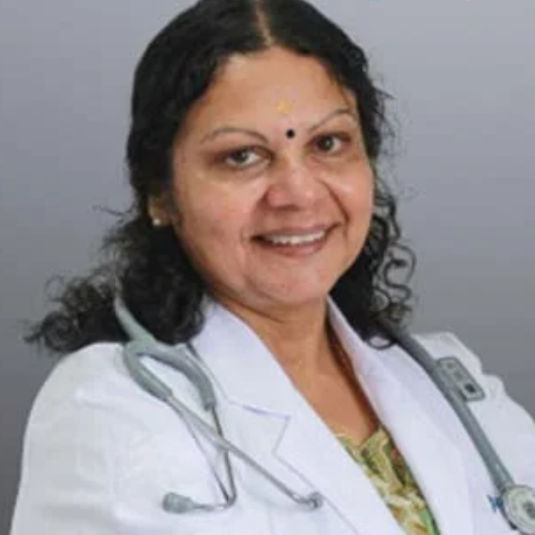Consult Intensivists Online - Critical Care Specialists (53 doctors)

Dr. Majarul Islam
Critical Care Specialist
13 Years • MBBS, MD (Anaes), DrNB (Critical Care Medicine)
Kolkata
WELL CURE, Kolkata

Dr. Nellutla Srujan
Anaesthesia
12 Years • MBBS, MD, IDCCM
Hyderabad
Vitals hospital, Hyderabad
Dr Sumanth R
General Physician
2 Years • MBBS
Bengaluru
Apollo Clinic, Sarjapur Road, Bengaluru

Dr. Akram Syed
Paediatrician
22 Years • MBBS, MD (Paediatrics), Worked as consultant Pediatric at Ministry of Health- OMAN
Bangalore
Apollo Clinic Bellandur, Bangalore
50+ recommendations

Dr. Chaithanya R
Internal Medicine Specialist Diabetologist
16 Years • MBBS, MD Internal Medicine, Fellowship in Diabetes(UK), CCEBDM(PHFI)
Bangalore
Apollo Clinic Bellandur, Bangalore

Dr Anubhav Chittari
General Surgeon
3 Years • MBBS, M.S GENERAL SURGERY
Bengaluru
Apollo Clinic, Sarjapur Road, Bengaluru

Dr. Sangamesh G Kowlgi
Family Physician
3 Years • MBBS
Bengaluru
PRESTIGE SHANTHINIKETAN - SOCIETY CLINIC, Bengaluru

Dr Venkata Naga Sai Tribhushan Rambhatla
General Physician
3 Years • MBBS
Bengaluru
PRESTIGE SHANTHINIKETAN - SOCIETY CLINIC, Bengaluru

Dr Varun Panicker
General Physician/ Internal Medicine Specialist
6 Years • MBBS
Bengaluru
Apollo Clinic, JP nagar, Bengaluru

Dr Anvitha A Shetty
Family Physician
4 Years • MBBS
Bengaluru
PRESTIGE SHANTHINIKETAN - SOCIETY CLINIC, Bengaluru

Dr. Jyothi Rajesh
Obstetrician and Gynaecologist
22 Years • MBBS, DGO(DNB)
Bangalore
Apollo Clinic Bellandur, Bangalore
50+ recommendations

Dr. Arthi S
Family Physician
3 Years • MBBS
Bengaluru
PRESTIGE SHANTHINIKETAN - SOCIETY CLINIC, Bengaluru

Dr. Renu Saraogi
General Physician/ Internal Medicine Specialist
21 Years • MBBS, PGDFM
Bangalore
Apollo Clinic Bellandur, Bangalore
150+ recommendations

Dr Shruti I
Obstetrician and Gynaecologist
7 Years • MBBS, MS (OBSTETRICS & GYNAECOLOGY)
Bangalore
Apollo Clinic Bellandur, Bangalore

Dr. Dershana P Rajaram
Obstetrician and Gynaecologist
35 Years • MBBS, DGO
Bangalore
Apollo Clinic Bellandur, Bangalore
Critical Care
Booking an appointment with a top critical care specialist is now easier than ever with Apollo 24|7. Our platform offers convenient online and phone booking options, allowing you to access the best critical care doctors near you. Be it you need a Doctor for Sepsis Recovery, Doctor for Emergency Dialysis, or any other critical care need, our trusted hospitals and clinics provide the expertise you can rely on. With a wide range of appointment slots available, you can easily schedule an online critical care specialist consultation at your convenience. Book your appointment with a critical care specialist today and receive the highest quality care for your critical health needs.
What is Critical Care?
Critical Care is a medical speciality that focuses on the assessment and treatment of patients who are critically ill or injured, requiring life-supporting interventions. The primary focus of critical care is to manage life-threatening conditions that significantly impair bodily functions, such as organ failures or severe injuries.
Critical care encompasses a wide range of conditions, including severe burns, cardiac arrest, heart failure, kidney failure, respiratory failure, sepsis, severe , brain haemorrhages, spinal cord injuries, and other serious infections or injuries.
This speciality is crucial in healthcare, providing intensive medical care to patients at high risk of death or significant morbidity, involving continuous monitoring head injuries and support using sophisticated equipment and a team of highly trained healthcare professionals.
Who is a Critical Care Specialist?
A Critical Care Specialist, often referred to as an intensivist, is a medical doctor who specialises in the care of critically ill patients. In India, critical care specialists typically undergo rigorous medical training, including completing an MBBS degree, followed by a postgraduate residency programme in a relevant speciality such as Internal Medicine, Anaesthesia, or Surgery.
They then pursue additional specialised training in critical care medicine through fellowship programmes or certification courses like the Indian Diploma in Critical Care Medicine (IDCCM) or the European Diploma in Intensive Care (EDIC).
These specialists are trained to diagnose and treat a wide range of critical illnesses and injuries, skilled in managing life-support systems, interpreting complex data from monitoring equipment, and making high-stakes decisions quickly. They play a crucial role in preventive healthcare by identifying and managing risk factors that could lead to critical illnesses.
What Does a Critical Care Specialist Do?
Critical care doctors are highly skilled medical professionals who provide comprehensive care for patients with life-threatening conditions. Whether you need a Doctor for sepsis Recovery or a Doctor for Emergency Dialysis, a critical care specialist is equipped to handle a wide range of critical care needs.
Some of the key responsibilities of critical care specialists include:
Continuously monitoring and assessing patients' vital signs and organ functions
Administering life-support treatments such as mechanical ventilation, dialysis, and ECMO
Managing complex medication regimens to treat infections, manage pain, and support organ function
Performing invasive procedures like central line insertions, chest tube placements, and tracheostomies
Coordinating with a multidisciplinary team of healthcare professionals to provide comprehensive patient care.
What are the Other Sub-specialities of Critical Care?
Critical Care encompasses several sub-specialities that cater to specific patient populations and conditions:
Mechanical Ventilation: This sub-speciality focuses on the management of patients who require assisted breathing through a ventilator, often due to respiratory failure or other critical conditions.
Central Line Insertion: Critical care specialists are trained in inserting central venous catheters, which are essential for administering medications, fluids, and nutrition to critically ill patients.
Endotracheal Intubation: This skill involves placing a tube into the patient's trachea to maintain an open airway and facilitate mechanical ventilation.
Hemodynamic Monitoring and Support: Critical care specialists use advanced monitoring techniques to assess and manage patients' cardiovascular function, ensuring adequate blood flow and oxygen delivery to vital organs.
Renal Replacement Therapy (Dialysis): In cases of acute kidney failure, critical care specialists initiate and manage dialysis to support the patient's renal function.
Sedation and Analgesia Management: Critically ill patients often require careful management of sedation and pain relief to ensure comfort and facilitate necessary interventions.
Blood Transfusion Therapy: Critical care specialists are skilled in managing blood transfusions to treat anaemia, bleeding disorders, or other conditions that require blood product support.
Sepsis Management: Sepsis is a life-threatening condition caused by the body's response to infection, and critical care specialists are trained in its early recognition and aggressive treatment.
Trauma and Emergency Care: Critical care specialists play a crucial role in managing patients with severe injuries or acute medical emergencies, stabilising their condition and coordinating further care.
Extracorporeal Membrane Oxygenation (ECMO): This advanced life-support technique involves using a machine to oxygenate the patient's blood outside the body, providing support for severe heart or lung failure.
Neurological Monitoring and Intervention: Critical care specialists are trained in monitoring and managing patients with severe neurological conditions, such as traumatic brain injuries or stroke.
Nutritional Support and Management: Critically ill patients often require specialised nutritional support, which critical care specialists oversee to ensure optimal recovery and prevent complications.
Post-Operative Critical Care: Patients who have undergone major surgeries may require intensive post-operative care, which critical care specialists provide to ensure a smooth recovery.
Cardiopulmonary Resuscitation (CPR): In the event of cardiac arrest, critical care specialists are skilled in performing CPR and leading the resuscitation team to restore circulation and breathing.
Intensive Monitoring and Care for Multisystem Failure: When multiple organ systems are failing, critical care specialists provide comprehensive monitoring and support to maintain vital functions and prevent further deterioration.
What are the Critical Care Examinations or Tests Performed by the Critical Care Specialist?
Critical care specialists perform a range of diagnostic tests and examinations to monitor and manage critically ill patients:
Vital Sign Monitoring: Continuous monitoring of heart rate, blood pressure, oxygen saturation, and respiratory rate using devices like heart monitors, pulse oximeters, and arterial catheters.
Blood Tests: Regular blood draws to check for electrolyte imbalances, organ function (e.g., liver and kidney function), and infection markers.
Imaging Studies: CT scans, X-rays, and ultrasound to assess organ function and detect complications such as pneumonia, pulmonary embolism, or internal bleeding.
Electrocardiogram (ECG): This test records the heart's electrical activity to detect arrhythmias, ischemia, or other cardiac abnormalities.
Arterial Blood Gas (ABG) Analysis: This test measures the levels of oxygen, carbon dioxide, and pH in the blood to assess respiratory function and guide ventilator management.
Pulmonary Function Tests: These tests evaluate lung function and help diagnose conditions like acute respiratory distress syndrome (ARDS) or chronic obstructive pulmonary disease (COPD).
Neurological Examinations: Critical care specialists perform regular neurological assessments to monitor patients with brain injuries or other neurological conditions, using tools like the Glasgow Coma Scale (GCS).
Invasive Hemodynamic Monitoring: In some cases, invasive monitoring techniques like Swan-Ganz catheterisation may be used to assess heart function and guide treatment decisions.
These examinations and tests help critical care specialists make accurate diagnoses, monitor patients' progress, and adjust treatment plans as needed to ensure the best possible outcomes for critically ill patients.
What are the Common Conditions & Diseases that Critical Care Specialists Treat?
Critical care specialists manage a wide range of life-threatening conditions that significantly impair bodily functions. Here are some of the most common conditions and diseases they treat:
Septic Shock and Sepsis: These conditions involve a severe infection that leads to widespread inflammation and potential organ failure. Early identification and aggressive treatment by a Doctor for Sepsis Recovery are crucial.
Cardiogenic Shock: A condition where the heart's pumping ability is severely compromised, leading to inadequate blood circulation and potential organ failure. A cardiac electrophysiologist may be involved in the treatment.
Acute Respiratory Failure: This includes conditions such as pneumonia, acute respiratory distress syndrome (ARDS), and severe asthma, where the lungs are unable to provide sufficient oxygen or remove carbon dioxide effectively.
Stroke and Traumatic Brain Injury: Critical care specialists manage patients with severe neurological injuries or conditions that require close monitoring and supportive care.
Multiorgan Failure: This involves failure of multiple organ systems, such as the heart, lungs, kidneys, and liver, which can arise from various underlying conditions.
Severe Infections: Including community-acquired pneumonia (CAP), hospital-acquired pneumonia (HAP), ventilator-associated pneumonia (VAP), and infections caused by drug-resistant bacteria.
Heart Failure: Conditions where the heart's ability to pump blood is compromised, leading to potential shock and organ failure. An electrophysiology cardiologist may be involved in the management.
Post-operative Intensive Care: Patients who require close monitoring after surgery, especially those undergoing major vascular or cardiac surgeries.
Acute Kidney Injury: Patients with severe kidney dysfunction may require Emergency Dialysis under the care of a critical care specialist.
These conditions require intensive medical care, close physiologic monitoring, and support from a multidisciplinary team of healthcare professionals.
Reasons to See a Critical Care Specialist
Early diagnosis and preventive care are crucial as they can significantly improve survival rates and reduce the risk of long-term complications. Here are six common reasons why a patient might need to see a critical care specialist:
Severe Respiratory Issues: Symptoms such as difficulty breathing, severe asthma, or pneumonia that requires mechanical ventilation.
Cardiovascular Emergencies: Conditions like cardiogenic shock, heart failure, or acute myocardial infarction that necessitate immediate intensive care.
Severe Infections: Patients with sepsis, septic shock, or severe infections that are resistant to antibiotics and require specialised care from a Doctor for Sepsis Recovery.
Neurological Emergencies: Stroke, traumatic brain injury, or intracranial haemorrhage that require close neurological monitoring and intervention.
Post-operative Complications: Patients who develop complications after surgery, such as unexpected bleeding, low blood pressure, or respiratory issues.
Multiorgan Dysfunction: Conditions where multiple organ systems are failing, requiring comprehensive and coordinated care from a critical care specialist.
What Types of Procedures do Critical Care Specialists Perform?
Here, we discuss the top therapies and surgeries performed within this speciality.
Top Therapies in Critical Care
Mechanical Ventilation: This therapy involves using a machine to assist or replace spontaneous breathing. It's employed in cases of respiratory failure due to various causes including trauma, infections, and chronic conditions.
Continuous Renal Replacement Therapy (CRRT): Used primarily for patients with acute kidney injury, CRRT facilitates blood filtration when traditional dialysis is not feasible due to the patient's instability.
Extracorporeal Membrane Oxygenation (ECMO): ECMO is a life-saving technique that provides cardiac and respiratory support to patients whose heart and lungs are severely diseased or damaged and cannot provide an adequate amount of gas exchange or perfusion to sustain life.
Intravenous Fluid Therapy: Critical for managing fluid balance in critically ill patients, this therapy involves the administration of fluid directly into the bloodstream to maintain adequate blood pressure and organ function.
Inotropic Therapy: This involves the use of medications to help the heart pump more effectively, supporting circulation in patients with heart failure.
Vasopressor Administration: Employed to raise blood pressure in patients suffering from shock, this therapy involves the administration of drugs that constrict blood vessels and increase heart output.
Pain Management: Effective pain control is vital in critical care settings, often involving sophisticated pain management strategies to alleviate discomfort and improve patient outcomes.
Nutritional Support: Providing nutritional support through enteral or parenteral methods is crucial for patients who are unable to eat by mouth.
Blood Product Transfusion: This involves transfusing blood products like red cells, platelets, or plasma to treat conditions like anaemia or coagulopathies.
Sedation and Delirium Management: Essential for patients who are mechanically ventilated or are experiencing severe distress.
Top Surgeries in Critical Care
Tracheostomy: Performed to secure an airway, this surgical procedure involves creating an opening through the neck into the trachea.
Central Venous Catheterisation: Inserting a catheter into a large vein, usually in the neck, chest, or groin, to administer medication or fluids and monitor heart pressures.
Chest Tube Placement: Essential for treating pneumothorax or pleural effusion, this procedure involves inserting a tube into the pleural space to remove air or fluid.
Emergency Laparotomy: A rapid abdominal operation to find and treat forms of acute abdominal conditions such as perforation, bleeding, or infection.
Craniotomy: Performed in cases of severe brain injury or bleeding, this involves surgically opening the skull.
When you need to book critical care specialist, it is crucial to consider a hospital or clinic that encompasses a comprehensive range of interventions, as critical care involves managing various complex conditions through both medical and surgical methods.
Why Choose an Apollo 24|7 Critical Care Specialist?
Critical care specialists at Apollo 24|7 offer several benefits. These specialists are highly experienced and certified, often with academic backgrounds and extensive experience in critical care medicine. Patients receive tailored treatment plans based on their specific needs and conditions, with access to cutting-edge medical equipment and technologies such as ECMO, artificial liver support, and advanced ventilatory care.
Consultations are available both online and in-clinic, ensuring comprehensive healthcare needs are met with convenience and accessibility. Critical care specialists work as part of a multidisciplinary team that includes critical care nurses, nutritionists, and psychologists, ensuring holistic care for critically ill patients.
What to Expect When Visiting a Critical Care Specialist?
When visiting a critical care specialist, patients can expect a thorough evaluation of their medical condition and a personalised treatment plan. Here's what you can anticipate:
Comprehensive Medical History: The specialist will review your medical history, including any pre-existing conditions, medications, and previous surgeries.
Physical Examination: A detailed physical examination will be performed to assess your current health status and identify any signs of critical illness.
Diagnostic Tests: Depending on your condition, the critical care specialist may order various diagnostic tests such as blood work, imaging studies (X-rays, CT scans, MRI), or specialised tests like echocardiography or pulmonary function tests.
Treatment Plan: Based on the diagnosis and severity of your condition, the specialist will develop a personalised treatment plan, which may include medications, interventional procedures, or advanced life support measures.
Multidisciplinary Care: Critical care specialists work closely with a team of healthcare professionals, including nurses, respiratory therapists, pharmacists, and other specialists, to provide comprehensive and coordinated care.
Family Involvement: The specialist will communicate with your family members, keeping them informed about your condition, treatment progress, and any important decisions that need to be made.
How Can I Get an Appointment With a Critical Care Specialist?
To get an appointment with a critical care specialist, you can follow these steps:
Online Booking: Visit the Apollo 24|7 website and navigate to the "Book an Appointment" section. Select "Critical Care" from the list of specialities and choose a critical care specialist based on their profile, experience, and critical care specialist reviews. Select a suitable date and time slot for your consultation.
Apollo 24|7 App: Download the Apollo 24|7 application on your smartphone. Log in or create an account, then select the "Doctors" tab. Choose "Critical Care" from the list of specialities and browse through the available critical care specialists. Select a doctor, date, and time slot for your appointment.
Call for Assistance: If you need help with the booking process or have specific queries, you can call the Apollo 24|7 helpline number and speak with a representative who will guide you through the appointment booking process.
Referral: If you are being referred to a critical care specialist by another healthcare provider, they may assist you in scheduling an appointment directly.
If you have any specific preferences, such as a critical care specialist near me, you can use the search filters on the Apollo 24|7 platform to find a suitable doctor in your preferred location.
Critical Care Specialists in top cities
- •Best Critical Care Specialists in Chennai
- •Best Critical Care Specialists in Kolkata
- •Best Critical Care Specialists in Mumbai
- •Best Critical Care Specialists in Ahmedabad
- •Best Critical Care Specialists in Arepally
- •Best Critical Care Specialists in Bhubaneswar
- •Best Critical Care Specialists in Hyderabad
- •Best Critical Care Specialists in Lucknow
- •Best Critical Care Specialists in New Delhi
- •Best Critical Care Specialists in Rourkela
Related Treatments
- •Treatment for Bluish Color On Lips And Face
- •Treatment for Cancer Pain Management
- •Treatment for Complex Trauma
- •Treatment for Drug Overdose
- •Treatment for Emergency Care
- •Treatment for Terminal Illness
- •Treatment for Endometrial Cancer
- •Treatment for Acute Diarrhea Treatment
- •Treatment for Ankle Pain
- •Treatment for Blood In Semen
FAQs
What is critical care?
Critical care is the specialised medical care provided to patients with life-threatening illnesses or injuries. It involves a multidisciplinary team of experienced healthcare professionals, including critical care doctors, nurses, and other specialists, working collaboratively to manage and support vital organ systems in an intensive care unit (ICU) setting.
Who are the healthcare professionals involved in critical care?
The critical care team includes an intensivist (a critical care specialist with special ICU training), hospitalist, critical care nurses, respiratory therapists, pharmacists, dieticians, and case managers/social workers. Each professional plays a crucial role in providing comprehensive care, from clinical management to patient and family support.
Why does my loved one act differently in the ICU?
Critical illness can affect the brain, causing confusion, which is common in the ICU. Sedation and pain medication can also contribute to a patient appearing sleepy or disoriented. Additionally, a breathing tube may prevent the patient from speaking until it is removed.
What are all these tubes and devices connected in ICU?
Each device serves a specific purpose: an endotracheal tube for breathing support, a feeding tube for nutrition and medications, a catheter for monitoring urine output, IVs for administering medications, a ventilator for life support, and an IV pump for regulating medicine flow.
Why are the doctors always changing in the ICU?
To ensure round-the-clock coverage by a critical care specialist, doctors work in 12-hour shifts. The intensivist in charge of your loved one's care will change during day and night shifts and every few days to maintain continuity of care.
How much does an electrophysiology cardiologist fee cost?
The electrophysiology cardiologist fee can vary depending on the complexity of the case, the specific procedures performed, and the healthcare setup. In India, the consultation fee may range from Rs. 500 to Rs. 2,000, while complex interventions like ablations or device implantations can cost several lakhs.
When might a patient require Emergency Dialysis in critical care?
A patient may require Emergency Dialysis in critical care when they develop acute kidney failure, which can occur due to various reasons such as severe infections, toxin exposure, or complications from other medical conditions. The critical care specialist works with a nephrologist to initiate timely dialysis to support the patient's kidney function and prevent further complications.
Where will my loved one go after leaving the ICU?
Most patients who improve will be transferred to a regular hospital ward. Some may need to go to a rehabilitation facility for further recovery, while others may be able to return home. Case managers help with discharge planning and provide resources to ensure a smooth transition.
What is the role of a Doctor for Sepsis Recovery in critical care?
A Doctor for Sepsis Recovery plays a crucial role in managing patients with severe infections that lead to sepsis, a life-threatening condition characterised by organ dysfunction. They closely monitor the patient's vital signs, administer antibiotics and other medications, and provide supportive care to prevent further deterioration and promote recovery.
What are the benefits of Online critical care specialist consultation?
Online critical care specialist consultation offers several benefits, including convenience, accessibility, and timely expert advice. It allows patients and their families to discuss concerns, seek second opinions, and get guidance on managing complex conditions from the comfort of their homes. It can also help in coordinating care and making informed decisions about treatment plans.